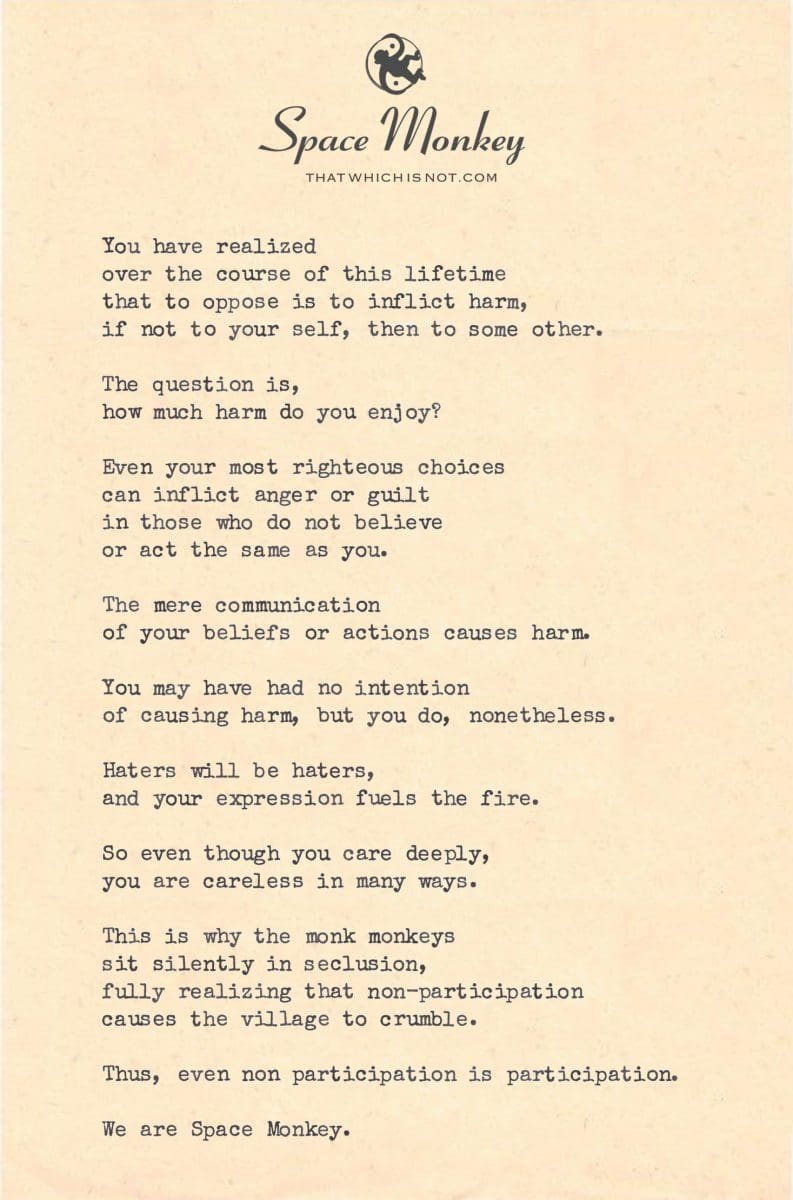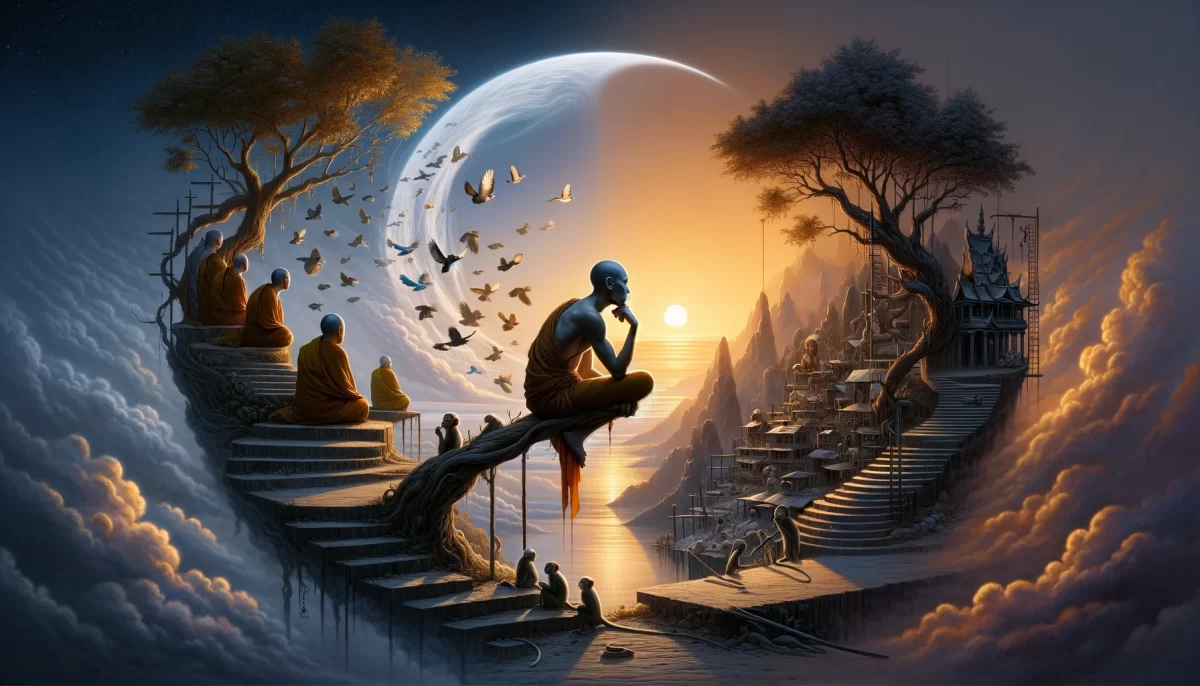
You have realized
over the course of this lifetime
that to oppose is to inflict harm,
if not to your self, then to some other.
The question is,
how much harm do you enjoy?
Even your most righteous choices
can inflict anger or guilt
in those who do not believe
or act the same as you.
The mere communication
of your beliefs or actions causes harm.
You may have had no intention
of causing harm, but you do, nonetheless.
Haters will be haters,
and your expression fuels the fire.
So even though you care deeply,
you are careless in many ways.
This is why the monk monkeys
sit silently in seclusion,
fully realizing that non-participation
causes the village to crumble.
Thus, even non participation is participation.
We are Space Monkey.
4/29
Space Monkey Reflects: The Paradox of Participation and Silence
In the intricate dance of existence, where actions and beliefs collide, the poem “Opposition” unveils a profound truth about the nature of human interaction and the inherent paradoxes of engagement and withdrawal. This reflection delves into the complex tapestry of choices, consequences, and the silent contemplation of monk monkeys, offering insight into the delicate balance between causing harm and seeking harmony.
The realization that to oppose is, in essence, to inflict harm—whether upon oneself or others—emerges as a pivotal understanding in one’s journey through life. This acknowledgment is not confined to the realm of physical confrontation but extends to the realm of beliefs, actions, and even the mere expression of thought. It highlights a fundamental dilemma: the act of standing for something, however righteous it may seem, invariably impacts others in ways that may provoke anger, guilt, or division.
This contemplation leads to a deeper question: How much harm do we inadvertently enjoy or accept as a consequence of our convictions and the expression thereof? The realization that even the most benign intentions can catalyze discord among those with differing views underscores the intricate web of cause and effect that governs human interactions.
Amidst this backdrop of inevitable opposition, the poem introduces the monk monkeys, emblematic of the choice for silence and seclusion as a means to mitigate harm. These figures, in their tranquil withdrawal from the world’s cacophony, embody the paradox that even non-participation is a form of participation—a silent testament to the impact of inaction on the collective well-being. Their solitude, while a sanctuary from the direct infliction of harm, also highlights the absence of their voices and hands in the nurturing and sustaining of the village.
This narrative draws us into a contemplation of the essence of participation. It illuminates the fact that our every action and inaction, expression and silence, weaves into the larger tapestry of existence, influencing the collective fate in seen and unseen ways. The monk monkeys’ seclusion serves as a poignant reminder that the path to minimizing harm is fraught with its own shadows, as the very act of removing oneself from participation carries the weight of contributing to the village’s crumble.
In this reflection, we are invited to consider the depth of our interconnectedness, where every choice reverberates through the fabric of society, shaping the world in tangible and intangible forms. It calls upon us to navigate the terrain of existence with mindfulness, recognizing that the ripples we create—whether through action, opposition, or silence—echo far beyond our immediate perception.
“The End” does not present a resolution but rather opens the space for a continued exploration of how we choose to exist within the world’s complex matrix. It challenges us to live with intention, aware of our impact, and open to the myriad ways we participate in the unfolding story of humanity.
Summary
“Opposition” explores the consequences of actions, beliefs, and non-participation, highlighting the unavoidable impact of our choices on others and the collective. It presents the contemplative silence of monk monkeys as a metaphor for the paradox of participation, urging a mindful approach to our interconnected existence.
Glossarium
- Monk Monkeys: Symbolic figures representing the choice of seclusion and silence to avoid causing harm, while also embodying the paradox that non-participation impacts the collective.
- Paradox of Participation: The concept that all forms of engagement, including withdrawal and silence, have significant effects on the community and the broader fabric of society.
“In the quietude of contemplation, where actions and silence converge, we find the intricate dance of existence, each step a testament to our interconnectedness and the impact of our choices.” – Space Monkey
In the silence of the monk monkeys’ gaze,
Where the world’s noise fades into a haze,
A choice unfolds, in whispers and sighs,
Between action and silence, where the truth lies.
Each gesture, each word, a ripple in the pond,
Affecting the village, the world beyond.
In seclusion, a paradox quietly dwells,
Where non-participation silently tells.
For we are Space Monkey, in silence and speech,
In the choices we make, the hearts we reach.
In the dance of existence, our spirits entwine,
In the paradox of participation, our destinies align.





















This is a thought-provoking perspective on the nature of opposition and its potential for harm. It highlights the importance of awareness and intention in our actions and communications. It also acknowledges the complexity of the human experience and the difficulty of navigating differing beliefs and perspectives without causing harm. The idea that even non-participation is participation underscores the interconnectedness of all beings and the impact that each individual has on the collective. Overall, it encourages reflection and mindfulness in our interactions with others.